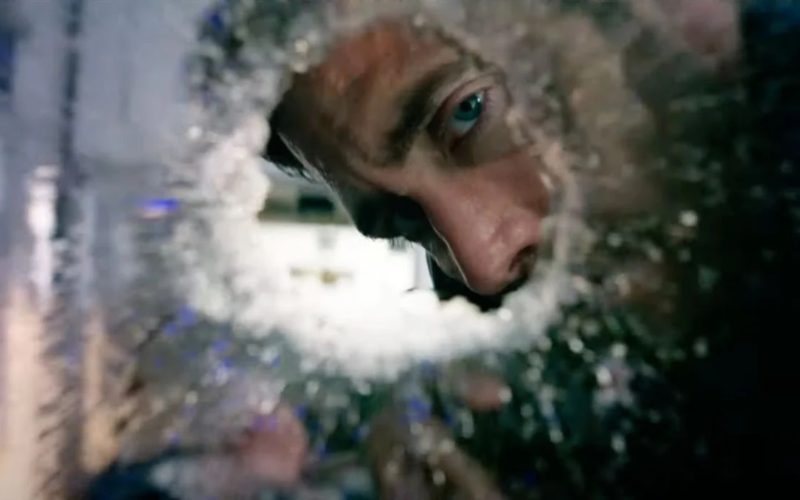Ambulance (Bay, 2022)
Ambulance is an amoral film about amoral people that made me angry.
That doesn’t mean you won’t like it, and if you don’t it may be for very different reasons. But there is probably a sliver of the potential audience subset that, like me, wouldn’t be averse to mindless action spectacle if the execution and ideology weren’t so damn insulting.
The issue is not so much that the characters or the film are amoral, but that the film doesn’t take its amorality seriously. It’s a plot patch that is malleable, allowing justifications and motivations to change from scene to scene and moment to moment in order to stretch what would normally be part of a bigger whole into a movie unto itself.
Warning: Beyond this point, there may be implied plot spoilers.
Yahya Abdul-Mateen II and Jake Gyllenhaal play the literal and metaphorical “brothers” who would do anything for (sibling) love, but they won’t do that…. Will (Abdul-Mateen II) needs a couple hundred grand for an operation for his wife that insurance won’t cover. His brother Danny (Gyllenhaal) has a warehouse full of cars (any one of which would probably cover Will’s bills) and a battery of weapons that suggest a budget bigger than most Latin American countries, but he will only help Will if his brother agrees to help him rob a bank. (I guess sometimes sibling love means never having to say you’re sorry for robbing banks.) Will says, no, no, no, well sure, and off we go.
One senses in this setup an attempt to make WIll sympathetic. Not only does he have bills to pay but he recognizes that Danny, as much as he loves him, is a psychopath, and Will’s instincts are that he can protect civilians from any of the more serious ancillary damage that might come from being robbed at gunpoint, shot, beaten, taken hostage, or whatever other minor but ultimately justifiable things might happen to them for crossing Danny’s path.
Nowhere is this more maddeningly offensive than when the movie deliberately invites comparisons to George Floyd’s death in a scene where a group of police officers and civilians watch a prostrate African-American man slowly dying, refusing to help. “He saved your partner!” one of the characters screams, by which she means, I guess, “He shot your partner but at least he slowed the ambulance down to forty miles per hour while I was performing emergency surgery on his ruptured spleen!” Even before that point the film has doubled and tripled down on the contention that the police “only” care about their injured fellow officer and would gladly allow the civilian hostage to be killed if that meant they could take their quarry dead rather than alive. It’s one of those mystifying and needless details that leave you wondering, do people really think that is what all cops are like?
Meanwhile, Danny spends the whole movie being a psychopath only to find a conscience when someone threatens his brother. Not for nothing, but the film gives Danny the motivation to keep the injured cop alive because he seems to think that as long as the cop doesn’t die he might only get twenty years instead of life. Umm, yeah, I guess, sure.
Ambulance is one of those movies that would fall apart if the movement ever stopped, so it never does. And despite the ambulance driving the wrong way at high speed up the freeway and causing multiple cars to crash (and the criminals firing at the same) no innocent bystanders appear to be killed. That’s convenient, but it’s not realistic.
So what’s the point? For a second I thought the film was going to make a parallel to the way the fog of war has settled over our civilian lives, clouding our thinking. There are great tragedies of cinema (The Godfather is one) that begin with little, understandable moral compromises that set off a chain of consequences that pull the sympathetic hero closer to or actually into the moral abyss. But this isn’t one of them. Will has ample opportunities to just pull over, so for all his talk about wanting to minimize the damage they are doing, part of him seems to want to get away. Of course, once the perpetrators are identified, one is hardly even sure what “get away” even means. Does Will think that if they ditch the pursuit he’s going to get to see his wife and kid again before…? Thus when he finally snaps and says, “we’re not walking off in the sunset” rather than feeling pity, I was thinking, “Took you long enough.”
Roger Ebert famously opined that a movie is not immoral because of what it is about but because of the way it is about whatever it is about. If I call Ambulance immoral or amoral, it’s not because it is about murderous bank robbers. It’s because it expects me to alternately care and not care that they are murderous bank robbers, and that turns out to be pretty difficult to do while trying to retain any moral compass whatsoever. Perhaps a time is coming, perhaps it is now here, when we will have been propagandized and gaslit so long that our morals become pliable to that degree.
I guess one small silver lining is that if we ever do get to that point, at least we’ll be easy to entertain because Amublance does have a lot of cool point-of-view drone photography.

